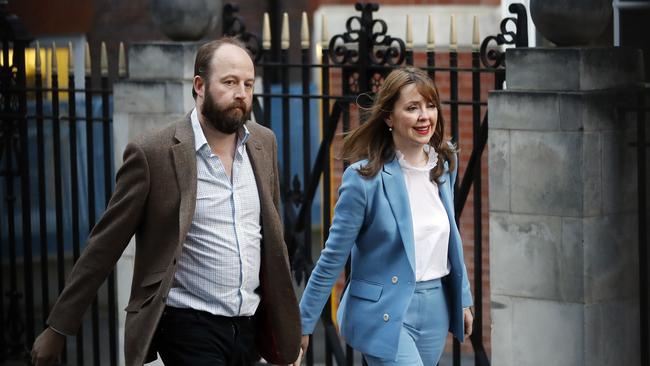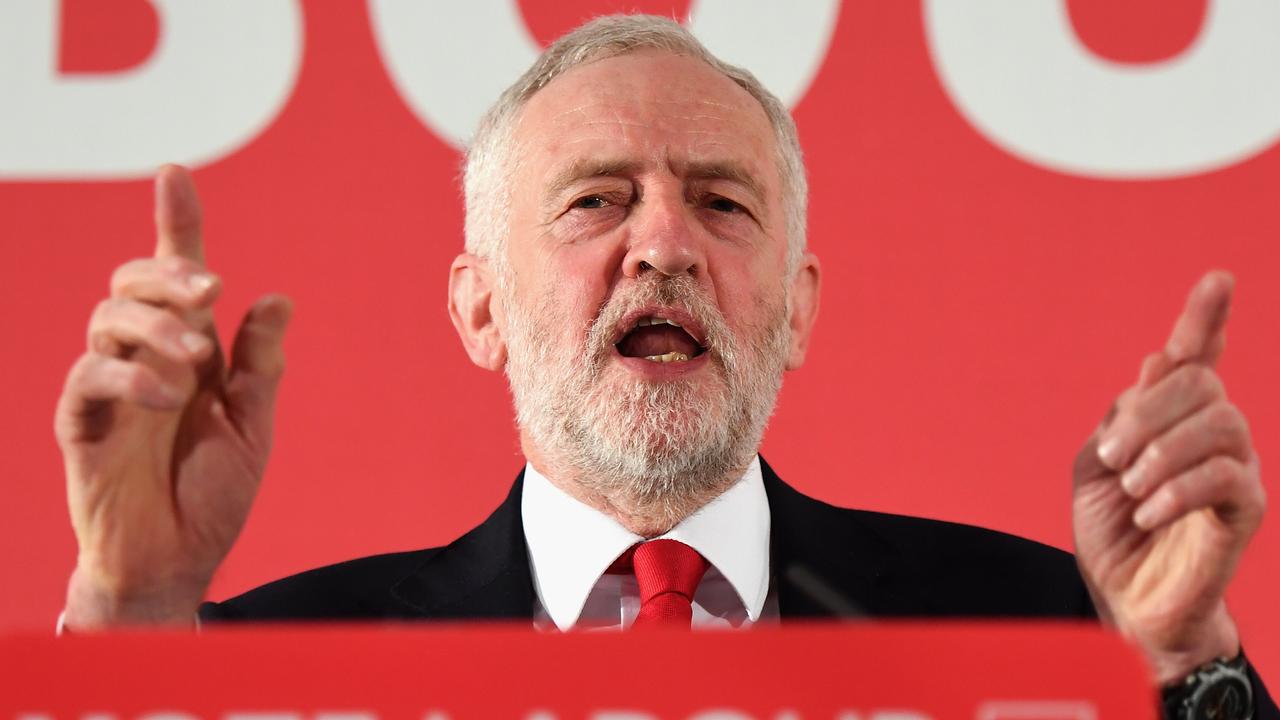UK election 2017: What happened inside May’s horror campaign
As her aides squabbled, the PM was incapable of salvaging a campaign she had been warned against mounting.

A month before Theresa May called the snap election that has sealed the British Prime Minister’s reputation — and perhaps her fate — one of her most vociferous allies insisted there would be no campaign.
“There is no way to do it without it being a shit show,” the ally remarked.
It is hard to top this prophecy of the catastrophe that has engulfed May and her closest aides. Seven weeks ago, May was mistress of all she surveyed: 20 points ahead in the polls and hailed by MPs and commentators for impressing voters across the political spectrum with her stubborn practicality. Today her premiership hangs by a thread after what Tory MPs say is the worst campaign they have ever seen, a campaign that cruelly exposed May’s strengths as her biggest weaknesses. Stubbornness became inflexibility and her healthy disdain for chasing the next headline was exposed as brittle nervousness when questioned by the media or the public.
After planning for a landslide, May arrived back at Conservative campaign headquarters in Westminster at 4.30am on Friday (1.30pm AEST) with the air of a broken woman on the verge of resignation.
“When she came in, it looked as if she was going to break down in tears,” one of those present recalled.
May told shell-shocked staff: “It’s not the result we wanted but we will try to form a government.”
She spoke about the party, not about herself. One senior campaign staffer thought: “She’s going.”
After two hours closeted with aides in the Thatcher boardroom, including her joint chiefs of staff, Fiona Hill and Nick Timothy, their deputy Jo Penn, campaign strategist Lynton Crosby and his pollster Mark Textor, the decision was taken to fight on and try to form a government with the Democratic Unionists, the Northern Ireland right-wing grouping.
Shortly before May left for Buckingham Palace to meet the Queen, she again revealed vulnerability. “She was crying before she went to the palace,” one source said.
A still “shell-shocked” May spent the weekend in her constituency. A Downing Street source said the decision to stay on had been shaped by her belief in public service: “Throughout all this she really was thinking about what was best for the country.”
Not all May’s colleagues have such noble motives. Events since the polls closed have unleashed jockeying for position between her cabinet colleagues and predictions she will be gone by the summer.
MPs and frontbenchers spent the weekend calling each other and consulting constituency chairmen and grassroots members about whether to trigger the coup to oust her.
Most consider a contest then would ensue between Foreign Secretary Boris Johnson and Brexit Secretary David Davis. Their seconds began sounding out fellow MPs within hours of the polls closing and a briefing war has already erupted among those who say Johnson’s appointment would be greeted with incredulity by other national leaders.
This weekend, details were circulating of a text message sent by a member of the German government to a British contact. It read: “Anyone but Boris”.
Johnson’s allies responded by pointing out that Davis, at 68, would be too old to lead the party into the next election and sought to blame him for the current fiasco. They recalled he was instrumental in persuading May to call the election in the first place. “DD was pushing very, very hard for it whereas Boris and Lynton advised against it,” a senior source said.
The bloodletting over who bears main blame for the disaster goes far wider, however. It pitches the allies of Hill and Timothy — who both resigned over the weekend — against admirers of Sir Lynton and Textor, who had enjoyed total control over the 2015 election campaign but were reduced to “adviser” status this time.
The Mayites charge that Sir Lynton was responsible for compelling May to run a negative campaign that forced her to parrot a series of sterile lines, hailing her own “strong and stable” leadership against the risks of a “coalition of chaos” run by Labour leader Jeremy Corbyn.
One source close to May said she complained privately: “I look stupid.” The source said: “We ran a campaign against our instincts and when we said ‘strong and stable’ had become a joke, we were told, ‘No changes’.”
This is a version of events that Sir Lynton’s allies say he does not recognise. They point out that their lead over Labour remained buoyant in the early part of the campaign and that it was not his fault the Prime Minister worked in her talking points so robotically — leading her to be dubbed the “Maybot”, a nickname even adopted by some junior campaign staff.
Their main complaint is that Sir Lynton was not given the control he had in previous campaigns and was almost entirely frozen out when it came to writing the Tory manifesto.
They believe its disastrous reception was the turning point of the campaign. “Lynton is fuming with them,” one campaign source said. “He is concerned his reputation will be trashed, when he did not have control.”
By the time the Tory manifesto was produced, Labour was already enjoying an upturn in support after its manifesto was leaked in full to newspapers and the BBC the week before it was due to be published.
The content was audacious — a £50 billion ($84bn) spending spree that offered feel-good baubles such as an £11bn bill to scrap university tuition fees. Insiders say the decision was taken that Corbyn should lay out what he believed and see what happened. “If you’re going to risk a political hit by borrowing £20bn, you might as well borrow £50bn,” one source said.
For four days, details of Labour’s plans dominated the headlines. Moderates believe aides to shadow chancellor John McDonnell were behind the leak. The Tories had lost the initiative.
By contrast, the Conservatives filled the news media with attack stories against Corbyn. “The BBC was never going to lead on those,” a senior Conservative admitted.
When the Tories finally announced some policy to chew on, that backfired spectacularly. “What cost us this election was the manifesto,” a campaign source said.
Proposals to abandon plans to cap social care costs, means-test winter fuel payments and offer another vote on fox-hunting quickly began to hurt the Tories on the doorstep. Candidates were already nervous about Labour making further inroads by condemning the Tory cuts.
“The public services cuts narrative has absolutely hammered us,” a campaign official said. “We were told the manifesto would tackle that, and it didn’t.”
The document was written by Timothy, Cabinet Office minister Ben Gummer (who went on to lose his Ipswich seat) and Will Tanner, another No 10 aide.
“It was Gummer and Nick who made the decisions. Lynton was totally frozen out of it,” a Conservative source said.
“A handful of people saw (the care policy) the day before the manifesto (was published).” Sir Lynton opposed it, as did Hill, but May sided with Timothy.
“Lynton’s approach is very simple,” a friend said. “You don’t do anything until you’ve researched it. That works when you have time. You can’t test an 84-page manifesto in a day and you can’t fatten a pig on market day.”
When the manifesto was published, it contained no good news. Candidates quickly reported back to head office that the “dementia tax” was repelling elderly voters and white working-class Labour supporters who had been flirting with supporting May’s party.
A prominent backbencher said: “It seemed like two people got off their potties without wiping their botties and wrote a manifesto.”
Nigel Evans, the MP for Ribble Valley, compared the moment to the Titanic: “We were steaming under blue skies and then we created our own iceberg and steered our campaign towards it.”
Even the manifesto launch was a shambles. When Conservative campaign headquarters staff arrived, they found there were more people invited than there were seats. “The location was not even decided until 6pm the night before,” a source said.
“At one point it was going to be in a war museum until someone pointed out that we were supposed to be launching a manifesto on Brexit and doing it next to Spitfires and Lancaster bombers might have an anti-European feel to it.”
The manifesto did not just bomb with voters, it also led to a simmering feud between the Mayites and the Crosbyites which is still running now. “From the manifesto on, it was all tits up,” said a seasoned Tory operative.
“It’s like tracing back through a divorce. There’s one big moment of conflict and after that every little thing the other party does pisses you off.”
Four days later, Sir Lynton persuaded May to commit to a cap on social care costs, the most screeching U-turn ever seen in a British election. But May did not say she had listened to the public; she glared at the press corps and said “Nothing has changed”.
Another Tory said: “Lynton told me that you have to be a strong leader to make a change like that. When I asked why May had not said that, he replied, ‘You’ll have to ask her that, mate’.”
Asked what was wrong with the manifesto, Sir Lynton allegedly replied: “A Conservative Party ought to have some conservative policies.”
Timothy’s enthusiasm for a more interventionist economic policy that did more for the poor contrasted sharply with Sir Lynton’s belief that a few core messages directed at the right voters were the key to victory.
As Timothy was publicly vilified, he privately blamed Sir Lynton for failing to sell May’s vision. Timothy wrote on his resignation: “The Conservative election campaign failed to get ... Theresa’s positive plan for the future across. It also failed to notice the surge in Labour support, because modern campaigning techniques require ever-narrower targeting of specific voters and we were not talking to the people who decided to vote for Labour.”
This was an Exocet missile aimed directly at Sir Lynton and his ally Jim Messina, the Tory data chief. The failure to spot a rising red tide had frustrated some government MPs leading up to election day. Of the 43 marginal seats May visited during the campaign, the Tories won only five.
“Candidates with majorities under 5000 were told they were safe and sent to campaign in Labour-held marginals,” said one MP who survived. “Some people told them to piss off and it’s just as well they did or they’d be out of jobs now.”
With the campaign in free fall after the manifesto, Sir Lynton took charge and got the message back on May’s strong suit — Brexit — the lone subject on which she was applauded when she took part in televised question sessions with voters. “If Lynton hadn’t been there, the wobble would have turned into an implosion and Jeremy Corbyn would have been prime minister,” a friend said.
Crosby also wheeled out accomplished media performers Boris Johnson and Amber Rudd to give May cover. Textor had been trying to get Johnson a prominent role for weeks. “He was pointedly saying that Boris could inject some energy,” a campaign source said.
Hill and Timothy were reluctant for May to share the limelight.
While Corbyn’s personal rating rose, May’s fell, and her confidence with it. Even when two terrorist attacks intruded — which the Tories originally believed would help them — she was unable to capitalise and found herself on the back foot over falling police numbers.
At 10pm on election night, Tory campaign staff were still hopeful of a majority of 60. When the exit poll predicted a hung parliament, there was a “stunned silence”. As the results began to show it was correct, one staff member became physically ill and keeled over.
The weaknesses that had set May back became more evident as the night wore on. When she was re-elected in Maidenhead, the PM’s speech was so leaden that MPs recognised several phrases cut and pasted from an email they had all received on “lines to take” in media appearances. “None of us read out that stuff — it’s fairly amazing that she did at a moment like that,” one said.
Her speech in Downing Street after returning from the palace did nothing to acknowledge the human cost to the MPs who had lost their seats. After complaints from Graham Brady, the shop steward for Tory backbenchers, she had to record a second television clip apologising for a loss they “didn’t deserve”.
One ministerial aide said: “Why doesn’t she read that speech and say ‘This is crap’ and demand a rewrite? Because she is spoonfed everything and has no judgment of her own.”
By 4am on Friday, the first calls and texts were flying between ministers and MPs, some urging Johnson to challenge May for the leadership.
Johnson is understood not to have responded to the missives winging his way, placing his phone on a table where aides could see that he was not encouraging his colleagues, but his backbench allies did take soundings.
By 6am, members of the backbench 1922 committee were calling staff at campaign headquarters asking whether the cabinet would trigger a coup.
By dawn, ministers had decided to demand the resignations of Timothy and Hill instead of May, saying the aides were over-mighty and insulting. May’s former spin doctor, Katie Perrior, broke cover to say they “stank” of arrogance.
A former minister predicted that defenestrating “the chiefs” would not save May: “King Charles I’s adviser, Strafford, was his most effective lieutenant but he had to be sacrificed and that left (the king) defenceless.” And we all know what happened to Charles I.
The Sunday Times




To join the conversation, please log in. Don't have an account? Register
Join the conversation, you are commenting as Logout